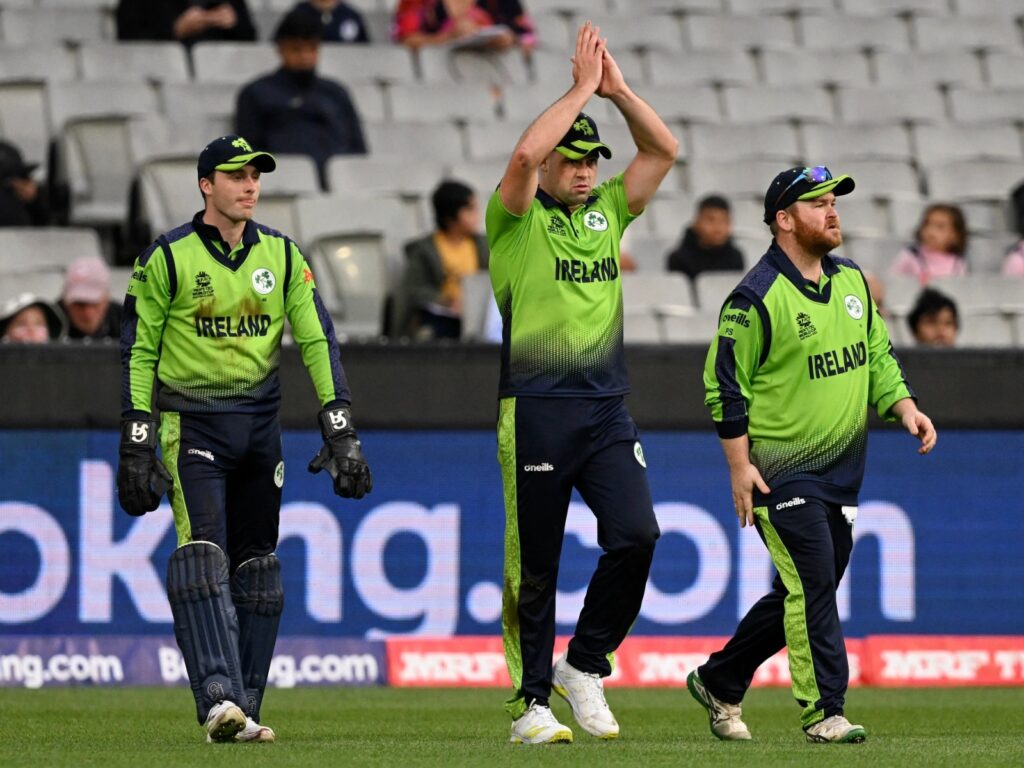In September 2013, Ireland hosted England in an ODI at Malahide in Dublin. Eoin Morgan, who had made his name in Irish colours, was leading England, and some of cricket’s most prominent journalists and broadcasters were settling into their seats. That was when Michael Atherton, who writes for The Times and is also part of Sky’s TV coverage, asked for the WiFi password. “Bangalore2011,” came the reply. “You’re kidding, right?” asked Atherton, who also captained England for nearly a decade. When he was told it was no joke, Atherton just laughed and said: “That’s brilliant!”
Those were golden years for Irish cricket. The victory over England in Bangalore in the 2011 World Cup featured a 50-ball century from Kevin O’Brien, which remains the fastest in the tournament’s history. That victory also neatly sandwiched triumphs against Pakistan in 2007, Ireland’s first World Cup, and over once-mighty West Indies in 2015. In each of those tournaments, Ireland were comfortably the best of the rest.
Especially in the Caribbean in 2007, the atmosphere that their fans created was unforgettable. The thrilling defeat of Pakistan is sadly most associated with the tragic death of Bob Woolmer a few hours later, but what transpired on the field was truly memorable. Pakistan were a long way short of the standards they had set while winning the World Cup in 1992 and reaching the final in 1999, but no one had expected them to be turned over by a bunch of part-timers.
The core of the team comprised gnarled old pros from Australia and South Africa, men who combined sales jobs and family life with taking time out to play for their adopted country. Others taught in schools, while Boyd Rankin, the giant fast bowler, came from farming stock. It was truly a motley crew, and they deservedly beat one of the giants of world cricket.
Just to prove that was no fluke, they thrashed Bangladesh – conquerors of India – on a fast and bouncy pitch in Barbados. Both in Jamaica in the opening round of games, and in Barbados in the Super Eights, the support they got was fantastic, with many of the old Irish classics like Molly Malone and the The Fields of Athenry belted out with or without the aid of speakers.
They were also fortunate in the extreme to be tailed by some incredibly committed journalists. One of them, Ian Callender, covered his 650th Irish cricket game during these World Cup qualifiers in Zimbabwe. Barry Chambers, their media manager at the time, was so ubiquitous that his Twitter handle, @irishcricket1, seemed entirely appropriate.
Those good times seem a long way off now. It’s hard to put a finger on just why Ireland were so poor in the qualifiers, other than to say that the conditions in Zimbabwe probably didn’t suit them as much as they did other teams. But that’s no excuse. The talent is still very much there. If you look at the last Cricket World Cup Super League stats, Harry Tector (1,062 runs) and Paul Stirling (991) were behind only Babar Azam in the run-scoring charts. Of the six bowlers to take more than 30 wickets, two – Craig Young and Josh Little, with 32 wickets apiece – were Irish.
Of course, those figures shouldn’t be viewed in isolation. The top sides, especially India, Australia and England often rotate their players to manage workloads, with the stars usually playing only the marquee series or tournaments. Despite that, those numbers suggest that it certainly isn’t lack of ability that’s holding Ireland back.
“We’ve tried to play a brand of cricket and we haven’t come close to the way we wanted to play over the last three games and haven’t covered ourselves in too much glory,” said Heinrich Malan, their head coach, after it was confirmed that Ireland would miss out on a second straight World Cup. “We have seen some individual performances but we haven’t had the collective which gets you over the line in big games, in big competitions. Hopefully we can see them in the remaining games here.”
Questions will also be asked of Warren Deutrom, who has been Cricket Ireland’s chief executive since 2006. In June 2022, the organisation conducted a Diversity, Inclusion and Equality Workship and Survey. Over half the respondents, 51 percent, said they had witnessed or experienced workplace bullying. And a staggering 81 percent of the staff had no faith or trust in senior management.
Kenyan cricket was in ruins within years of reaching a World Cup semi-final in 2003. Zimbabwe are only now limping back to the big tent after decades of administrative misdeeds, and West Indies cricket has been in the doldrums for years because of frequent conflict between the players and the board. The cautionary tales are right there for Irish cricket to see and learn from. For the sake of their amazing fans and the incredible men and women who have helped sustain a sport that comes nowhere close to football, rugby or the Gaelic variants in the popularity stakes, those in charge need to wake up and smell the coffee beans.




